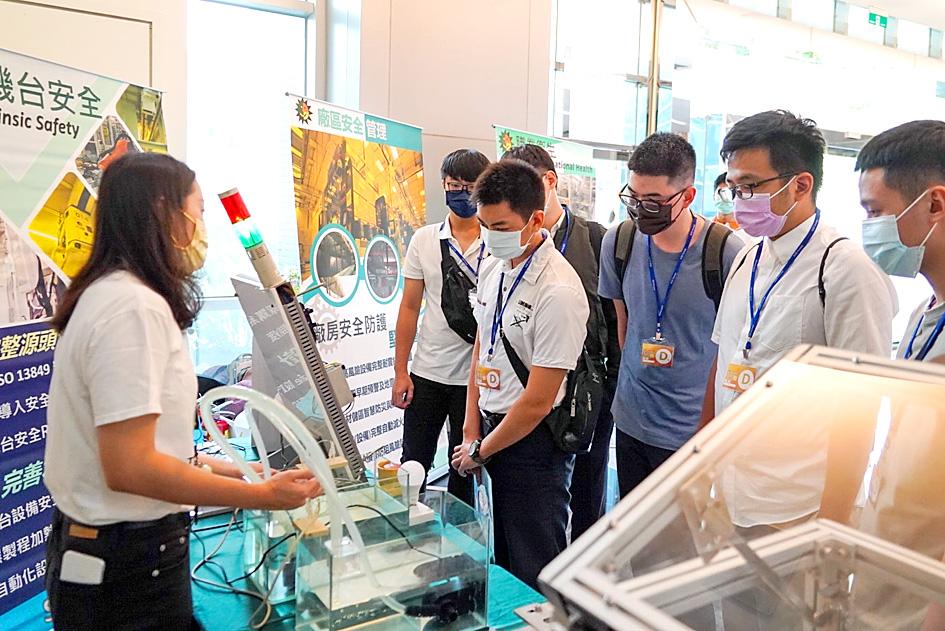ASE Technology Holding Co (日月光投控) is planning to hire more than 2,000 workers by the end of this year as the world’s largest IC packaging and testing services provider continues to expand production, the firm said on Saturday, the first day of a massive recruitment campaign for its Kaohsiung production base
The firm is seeking engineers, management trainees and production assistants, ASE said, adding that it is holding walk-in interviews at its K10 plant.
ASE would also continue to work closely with academic institutions to provide training opportunities to enlarge its talent pool, it said.

Photo courtesy of ASE Technology Holding Co
Kaohsiung has become one of the most important semiconductor hubs, ASE said.
To offer interested jobseekers a better understanding of the industry, ASE is holding a series of exhibitions, focusing on the link between IC packaging and testing services, and emerging technologies such as 5G, the Internet of Things and automotive electronics, it said.
Late last month, the board of directors of ASE-owned Advanced Semiconductor Engineering Inc (日月光半導體) approved a plan to build a flip-chip packaging and testing plant in the city, the company said.
Construction at the new plant is scheduled to be completed by the end of the third quarter next year, it added.
In the first half of this year, ASE posted a net profit of NT$18.82 billion (US$679.35 million), up 73.6 percent from a year earlier, with earnings per share of NT$4.37, compared with NT$2.54 in the same period last year.
ASE attributed the strong showing to solid global demand.
Revenue in the first half of this year rose 20.25 percent from a year earlier to NT$246.40 billion.
ASE expected its revenue and earnings to grow further in the second half on the back of rising global demand.

SEMICONDUCTORS: The firm has already completed one fab, which is to begin mass producing 2-nanomater chips next year, while two others are under construction Taiwan Semiconductor Manufacturing Co (TSMC, 台積電), the world’s largest contract chipmaker, plans to begin construction of its fourth and fifth wafer fabs in Kaohsiung next year, targeting the development of high-end processes. The two facilities — P4 and P5 — are part of TSMC’s production expansion program, which aims to build five fabs in Kaohsiung. TSMC facility division vice president Arthur Chuang (莊子壽) on Thursday said that the five facilities are expected to create 8,000 jobs. To respond to the fast-changing global semiconductor industry and escalating international competition, TSMC said it has to keep growing by expanding its production footprints. The P4 and P5

DOWNFALL: The Singapore-based oil magnate Lim Oon Kuin was accused of hiding US$800 million in losses and leaving 20 banks with substantial liabilities Former tycoon Lim Oon Kuin (林恩強) has been declared bankrupt in Singapore, following the collapse of his oil trading empire. The name of the founder of Hin Leong Trading Pte Ltd (興隆貿易) and his children Lim Huey Ching (林慧清) and Lim Chee Meng (林志朋) were listed as having been issued a bankruptcy order on Dec. 19, the government gazette showed. The younger Lims were directors at the company. Leow Quek Shiong and Seah Roh Lin of BDO Advisory Pte Ltd are the trustees, according to the gazette. At its peak, Hin Leong traded a range of oil products, made lubricants and operated loading

The growing popularity of Chinese sport utility vehicles and pickup trucks has shaken up Mexico’s luxury car market, hitting sales of traditionally dominant brands such as Mercedes-Benz and BMW. Mexicans are increasingly switching from traditionally dominant sedans to Chinese vehicles due to a combination of comfort, technology and price, industry experts say. It is no small feat in a country home to factories of foreign brands such as Audi and BMW, and where until a few years ago imported Chinese cars were stigmatized, as in other parts of the world. The high-end segment of the market registered a sales drop

Citigroup Inc and Bank of America Corp said they are leaving a global climate-banking group, becoming the latest Wall Street lenders to exit the coalition in the past month. In a statement, Citigroup said while it remains committed to achieving net zero emissions, it is exiting the Net-Zero Banking Alliance (NZBA). Bank of America said separately on Tuesday that it is also leaving NZBA, adding that it would continue to work with clients on reducing greenhouse gas emissions. The banks’ departure from NZBA follows Goldman Sachs Group Inc and Wells Fargo & Co. The largest US financial institutions are under increasing pressure